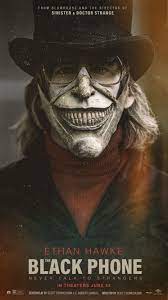
THE BLACK PHONE
US, 2022, 103 minutes, Colour.
Mason Thames, Madaleine McGraw, Ethan Hawke, Jeremy Davies, E.Roger Mitchell, James Ransone, Miguel Cazarez Mora.
Directed by Scott Derrickson.
There is an ugly masked face in the promotion for The Black Phone. It looks like a horror film. But, it is more of a terror film than a horror film. Horror as we understand it today suggests blood and gore, impossible, beyond this world situations. Terror, on the other hand, has situations that we can identify with, not such an emphasis on physical violence (though there can be some of that as here) but, rather, on the psychological.
Director, Scott Derrickson has made a number of interesting films over the decades, sometimes with religious implications (he studied theology at University): Exorcism of Emily Rose, the remake of The Day the Earth Stood Still, Sinister and the exorcism film, Deliver us from Evil. The setting for this film is Denver, 1978, focusing on a 12-year-old boy (which was where Derrickson himself was at that time). So, this is principally a story about children, seeing them play baseball, game rivalries, school classes, bullying, harsh lives at home. And, several of the children have been abducted and have disappeared, the villain nicknamed by the media The Grabber.
The focus here is on a young boy, Finney (Mason Thames), not yet able to stand up for himself against the bullies or the brutal treatment at home by his father (Jeremy Davies). However, he is strongly supported by his younger sister, Gwen (strong screen presence by Madaleine McGraw). But here is where something mysterious happens. While Gwen prays to Jesus for the children to be found (and when she is upset with Jesus she gives him quite a crass tongue lashing), she also has dreams about the children, about the abduction, visionary and fearful dreams. The police interrogate Gwen to her father’s anger.
And then Finney is abducted and, at last we see The Grabber, mainly with his monstrous mask, an ogre, and confining Finney to a harsh basement, a mattress, a toilet, little food… So, the audience has to share in his terror, a 12-year-old trying to deal with The Grabber (played by Ethan Hawke, a character with no redeemable qualities, completed evil).
And the black phone? It is in the basement, disconnected, but rings, some crackling, some silence, some voices – the voices of the children previously abducted, communicating with Finney, making suggestions to help him escape, and the film using the device of them appearing visually on screen though unseen by Finney. Which adds, of course, to the eerie atmosphere.
Gwen continues to dream, alerts the police, and the possibilities for saving Finney. But Finney has learnt from his ghostly visitors, especially a boy who had saved him from the bullies in the past, who urges Finney to stand up for himself against The Grabber.
The eerie thing about terror of films is that we can identify more readily with the victims than we do in horror films.
- Terror film rather than a horror film? The villain is immortal? The touches of the supernatural, Gwen and her prayer, the dreams and visions, the ghostly apparitions in the basement, the ghosts appearing on the street to identify the house?
- Denver, the suburbs, homes, school, laboratories, streets, the sinister house, the basement? Police precincts? The musical score? 1978?
- The focus on the young characters, the opening, games, school, bullying, classes and experiments? Finney in this context, his age, name calling, being bashed? The sequence in the toilet, Robin and his bashing the boy mercilessly, coming to Finney’s rescue, urging him to stand up for himself? Finney at home, his father, gruff, cruel, memories of the mother, her dreams, Gwen and her dreams, her father beating her?
- Gwen, supporting Finney, tough-minded, standing up for herself, the range of dreams, visualised, indicating The Grabber? The police coming to the school, interrogation, her father being upset?
- Finney, the baseball game, his pitching, the batsman, congratulating him, and his being abducted? The black van, the further abductions and disappearances?
- The police, investigations, interrogations, Gwen? The father?
- Finney, his being abducted, the basement, bare, the grille and the sun shining in, the mattress, the toilet, the mats? His attempt to get to the grille, later success? Lack of food?
- The Grabber, his personality, wearing the mask, without the mask, a grotesque monster, ogre? The screenplay not really giving indications for his motivation? His brother in the house, the drugs? Killing the children, burying them? Delaying with Finney, wanting to watch him, sitting on the steps, leaving the door open, Finney going upstairs, the Grabber and his threats?
- The phone, central, disconnected, yet ringing, the noise, the voices, the past victims, unable to identify themselves, giving various hints and clues to Finney? His acting on them, digging the wall, the room the floor, the code for the lock? The device of having the children appear, yet Finney not seeing them, Robin as the last victim, encouraging Finney to stand up for himself, with the phone, training him to pivot on his feet and use the phone?
- The buildup to the finale, the confrontation with The Grabber, the phone, Max coming down, The Grabber killing him with the axe? Finney and his standing up for himself, the attack, The Grabber’s death, Finney’s escape?
- In the meantime, Gwen and her vivid dream, the code number with a scene in the diner? Advising the police, going to the house, the search, the basement, the graves? The opposite house and The Grabber?
- Finney returning to school, the bullies subdued, the young girl wanted to sit next to him, his sense of asserting himself? The father asking forgiveness of Finney and Gwen?